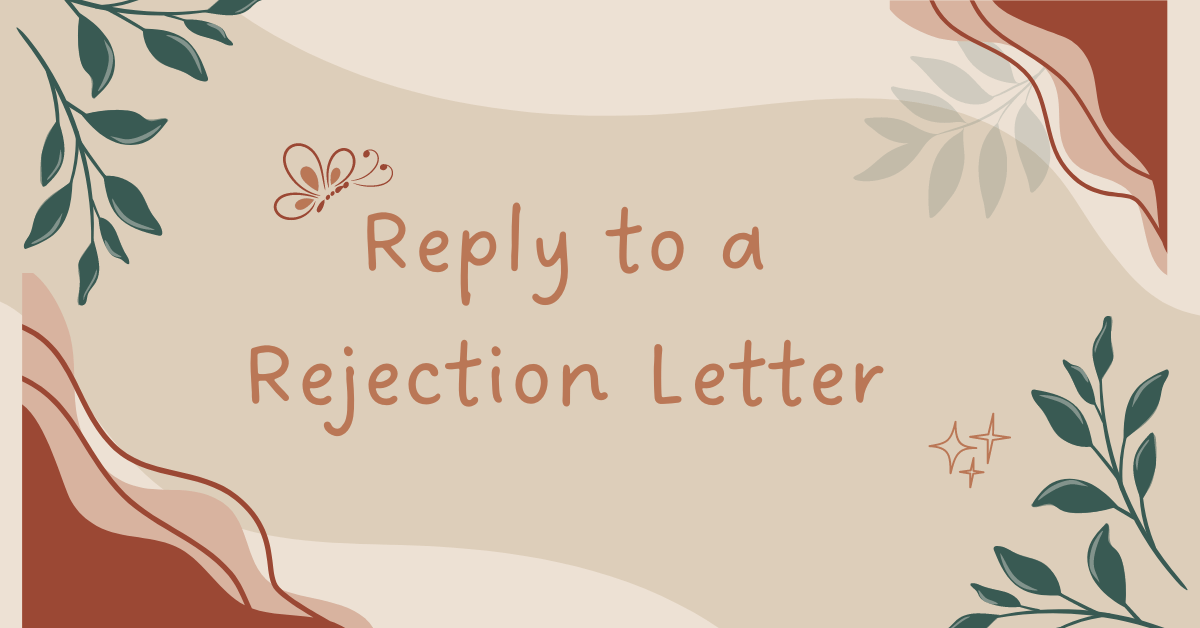Reply to a rejection letter is the act of responding to a formal communication from an organization or individual informing you that your application or proposal has been declined. Its purpose is to express gratitude for the consideration, seek feedback if applicable, and potentially keep communication channels open for future opportunities.
In this article, we’ll provide you with various templates, examples, and samples of replies to rejection letters. These resources aim to assist you in crafting a well-written and professional response, ensuring that your message is clear, courteous, and respectful. Whether you’re responding to a job application rejection, a declined proposal, or any other type of rejection letter, our samples will help streamline the process and effectively communicate your message.
By offering these templates and examples, we aim to simplify the task of composing a reply to a rejection letter. Whether you’re seeking to maintain a positive relationship with the sender, request further feedback, or simply express gratitude for the opportunity, our collection of samples will provide you with the guidance and inspiration you need to craft a thoughtful and appropriate response.

Sample of a Reply to a Rejection Letter
[Your Name]
[Your Address]
[City, State, Zip Code]
[Your Email Address]
[Your Phone Number]
[Date]
[Sender’s Name]
[Sender’s Position/Company Name]
[Company Address]
[City, State, Zip Code]
Dear [Sender’s Name],
I hope this letter finds you well. I wanted to take a moment to express my gratitude for considering my [application/proposal] and for taking the time to send me a thoughtful response. While I am disappointed to learn that my [application/proposal] was not successful, I appreciate the opportunity to have been considered for [position/project].
I would like to extend my sincere gratitude for the feedback provided in your letter. Your insights are invaluable to me, and I am committed to using them to enhance my skills and qualifications for future opportunities. Your constructive criticism has inspired me to [mention specific areas of improvement or development].
Please know that I remain enthusiastic about the possibility of working with [company name] in the future. I am genuinely impressed by [company’s values/mission/achievements], and I believe that my [skills/experience] would be a valuable asset to your team.
Thank you once again for your consideration and feedback. I look forward to the possibility of crossing paths again in the future. In the meantime, please do not hesitate to reach out if there are any upcoming opportunities that align with my qualifications.
Warm regards,
[Your Name]
How to Write a Reply to a Rejection Letter
Crafting an Effective Response: How to Write a Reply to a Rejection Letter
Understanding the Purpose
Replying to a rejection letter serves several purposes, including expressing gratitude for the consideration, seeking constructive feedback, and potentially leaving the door open for future opportunities. It’s essential to grasp the underlying intent behind your response before crafting it.
Setting the Right Tone
The tone of your reply should strike a balance between professionalism and gratitude. While it’s natural to feel disappointed by the rejection, maintaining a courteous and respectful tone is crucial. Avoid sounding bitter or resentful, as this can harm your professional reputation.
Expressing Gratitude
Begin your response by expressing sincere appreciation for the opportunity and the time the sender took to consider your application or proposal. Even if the outcome wasn’t what you hoped for, acknowledging their effort reflects positively on your character.
Seeking Feedback (Optional)
If appropriate, consider politely requesting feedback on your application or proposal. Constructive criticism can provide valuable insights for self-improvement and future endeavors. However, be prepared to receive feedback graciously, regardless of its nature.
Highlighting Continued Interest
Convey your continued interest in the organization or project despite the rejection. Emphasize your admiration for their work and express enthusiasm for potential future collaborations. This demonstrates your professionalism and leaves a positive impression.
Closing with Grace
End your reply on a warm and gracious note, reiterating your gratitude for the opportunity and expressing optimism for the future. Leaving a lasting impression of professionalism and courtesy is essential, as you never know when paths may cross again.
Proofreading and Polishing
Before sending your reply, take the time to proofread it carefully for errors in grammar, spelling, and punctuation. A well-crafted and error-free response reflects attention to detail and professionalism. Ensure that your message is clear, concise, and respectful.
In conclusion, replying to a rejection letter requires finesse and tact. By understanding the purpose, setting the right tone, expressing gratitude, seeking feedback (if appropriate), highlighting continued interest, closing with grace, and proofreading meticulously, you can craft a response that reflects your professionalism and leaves a positive impression.
FAQs about a Reply to a Rejection Letter
Navigating the realm of professional correspondence can be daunting, especially when it comes to responding to rejection letters. Here are the top five frequently asked questions on the topic:
1. How should I express gratitude in my reply to a rejection letter?
In your response, express sincere appreciation for the opportunity and the time the sender took to consider your application or proposal. Even if the outcome wasn’t what you hoped for, acknowledging their effort reflects positively on your character.
2. Is it appropriate to request feedback in my reply?
Depending on the circumstances, politely requesting feedback on your application or proposal can be appropriate. Constructive criticism can provide valuable insights for self-improvement and future endeavors.
3. Should I maintain interest in future opportunities despite the rejection?
Yes, it’s essential to convey your continued interest in the organization or project despite the rejection. Emphasize your admiration for their work and express enthusiasm for potential future collaborations.
4. How can I ensure my reply maintains a professional tone?
To maintain a professional tone, strike a balance between professionalism and gratitude. Avoid sounding bitter or resentful, as this can harm your professional reputation.
5. Is it necessary to proofread my reply before sending it?
Absolutely. Before sending your reply, take the time to proofread it carefully for errors in grammar, spelling, and punctuation. A well-crafted and error-free response reflects attention to detail and professionalism.
RELATED:
